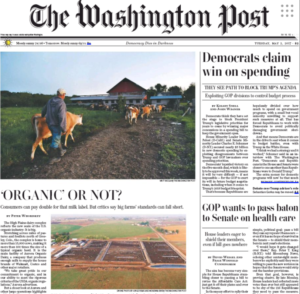Peter Whoriskey reported on the front page of today’s Washington Post that, “The High Plains dairy complex reflects the new scale of the U.S. organic industry: It is big.
“Stretching across miles of pastures and feedlots north of Greeley, Colo., the complex is home to more than 15,000 cows, making it more than 100 times the size of a typical organic herd. It is the main facility of Aurora Organic Dairy, a company that produces enough milk to supply the house brands of Walmart, Costco and other major retailers.”

Front page of today’s Washington Post.
The Post article noted that, “But a closer look at Aurora and other large operations highlights critical weaknesses in the unorthodox inspection system that the Agriculture Department uses to ensure that ‘organic’ food is really organic.
“The U.S. organic market now counts more than $40 billion in annual sales and includes products imported from about 100 countries. To enforce the organic rules across this vast industry, the USDA allows farmers to hire and pay their own inspectors to certify them as ‘USDA Organic.’ Industry defenders say enforcement is robust.
“But the problems at an entity such as Aurora suggest that even large, prominent players can fall short of standards without detection.”
Today’s article explained that, “With milk, the critical issue is grazing. Organic dairies are required to allow the cows to graze daily throughout the growing season — that is, the cows are supposed to be grass-fed, not confined to barns and feedlots. This method is considered more natural and alters the constituents of the cows’ milk in ways consumers deem beneficial.
“But during visits by The Washington Post to Aurora’s High Plains complex across eight days last year, signs of grazing were sparse, at best. Aurora said its animals were out on pasture day and night, but during most Post visits the number of cows seen on pasture numbered only in the hundreds. At no point was any more than 10 percent of the herd out. A high-resolution satellite photo taken in mid-July by Digital Globe, a space imagery vendor, shows a typical situation — only a few hundred on pasture.”
The Post article added that, “If organic farms violate organic rules, consumers are being misled and overcharged.
“In the case of milk, consumers pay extra — often double — when the carton says “USDA Organic,” in the belief they are getting something different. Organic dairy sales amounted to $6 billion last year in the United States.”
“The failure to comply with organic standards also harms other farms, many of them small. Following the rules costs extra because grazing requires more land and because cows that dine on grass typically produce less milk,” today’s article said.

